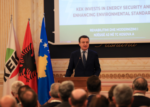President Donald Trump has announced plans to issue an executive order to reform or potentially shut down FEMA, citing inefficiencies in disaster response and advocating for state-led solutions.
U.S. President Donald Trump has revealed plans to sign an executive order aimed at reforming or possibly shutting down the Federal Emergency Management Agency (FEMA). Trump made the announcement during a visit to North Carolina, where he assessed the damage caused by Hurricane Helene.
Trump’s Criticism of FEMA
Calling FEMA a “disaster” in itself, Trump questioned its effectiveness in responding to emergencies. He emphasized that the agency imposes “unreasonable rules” due to its lack of familiarity with local areas, which hampers relief efforts.
“I honestly think FEMA is not useful,” Trump remarked. “Governors, regardless of party affiliation, should leverage state resources to address crises instead of relying on FEMA.”
A Push for State-Led Solutions
Trump argued that governors should take charge of disaster management by strengthening state-level emergency response systems. He suggested that dependence on FEMA results in unnecessary delays and inefficiencies.
“Whether you’re a Democrat or Republican governor, you need to use your state’s power to solve these issues rather than wasting time calling FEMA,” Trump stated.
Possible Reforms Ahead
Trump’s proposal for a “radical reform” or potential closure of FEMA has sparked discussions about the future of federal disaster management. While details of the executive order are yet to be disclosed, it reflects his broader stance on reducing federal oversight and empowering state governments.
Critics argue that FEMA plays a vital role in coordinating nationwide disaster responses, especially in large-scale emergencies that overwhelm state capacities. However, Trump’s supporters believe that decentralizing disaster management could lead to more efficient and tailored solutions.
As the debate unfolds, the potential reforms to FEMA could reshape how the U.S. handles natural disasters and emergencies in the years to come.







